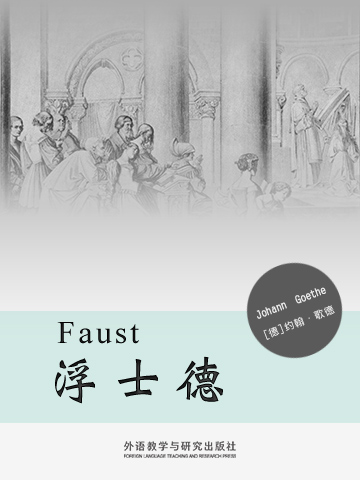《浮士德》是一部长达一万二千一百一十一行的诗剧,第一部二十五场,第二部二十七场。《浮士德》根据德国一个炼金术士向魔鬼出卖灵魂以换取知识和青春的古老传说,反其意而之,演示了广阔、深邃而崇高的人生内容,为人类自强不息的进取精神唱了一出迄今响彻寰的凯歌。这部不朽的诗剧,以德国民间传说为题材,以文艺复兴以来的德国和欧洲社会为背景,写一个新兴资产阶级先进知识分子不满现实,竭力探索人生意义和社会理想的生活道路,是一部现实主义和浪漫主义结合得十分完好的诗剧。
Goethe's Faust has inspired a great deal of literature, music, and illustration.
Walter Kaufmann asserts that "Goethe created a character [i.e. Faust] who was accepted by his people as their ideal prototype."
Although today many of the classical and Central European themes may be hard for the modern reader to grasp, the work remains a resonant parable on scientific learning and religion, passion and seduction, independence and love, as well as other subjects. In poetic terms, Goethe places science and power in the context of a morally interested metaphysics. Faust is a scientific empiricist who is forced to confront questions of good and evil, God and the devil, sexuality and mortality.
The German language has itself been influenced by Goethe's Faust, particularly by the first part. One example of this is the phrase "des Pudels Kern," which means the real nature or deeper meaning of something (that was not evident before). The literal translation of "des Pudels Kern" is "the core of the poodle," and it originates from Faust's exclamation upon seeing the poodle (which followed him home) turn into Mephistopheles. Another instance originates in the scene wherein Gretchen asks Faust if he is religious. In German, the word "Gretchenfrage" (literally "Gretchen question") refers to a question aiming at the core of the issue, often forcing the answering person to make a confession or a difficult decision.
《浮士德》是一部长达一万二千一百一十一行的诗剧,第一部二十五场,第二部二十七场。《浮士德》根据德国一个炼金术士向魔鬼出卖灵魂以换取知识和青春的古老传说,反其意而之,演示了广阔、深邃而崇高的人生内容,为人类自强不息的进取精神唱了一出迄今响彻寰的凯歌。这部不朽的诗剧,以德国民间传说为题材,以文艺复兴以来的德国和欧洲社会为背景,写一个新兴资产阶级先进知识分子不满现实,竭力探索人生意义和社会理想的生活道路,是一部现实主义和浪漫主义结合得十分完好的诗剧。
Much of the content of this article is translated from the equivalent German-language Wikipedia article (retrieved November 6, 2005). The German articles Johann Wolfgang von Goethe, Gustaf Gründgens, and Knittelvers were also referred to. The following references are cited by the German-language Faust I
- Introductory Note
- The Tragedy Of Faust—Dedication
- Prologue For The Theatre
- Prologue In Heaven
- Night
- Before The Gate
- Study
- Study
- Auerbach's Cellar In Leipzig
- The Witch's Kitchen—Faust, Mephistopheles And The Monkies
- The Witch Returns
- Evening—A Small And Neat Room
- Promenade—Faust And Mephistopheles
- The Neighbour's House—Martha, Margaret And Mephistopheles
- A Street—An Evening Walk In The Garden
- A Garden
- A Summer-House
- Forest And Cavern—Faust And Mephistopheles
- Margaret's Room
- Martha's Garden
- Night.
- In The Cathedral
- Walpurgis—Night
- A Little Pair
- A Gloomy Day. A Plain
- Night.













 京公网安备 11010802032529号
京公网安备 11010802032529号
笔记加载中...